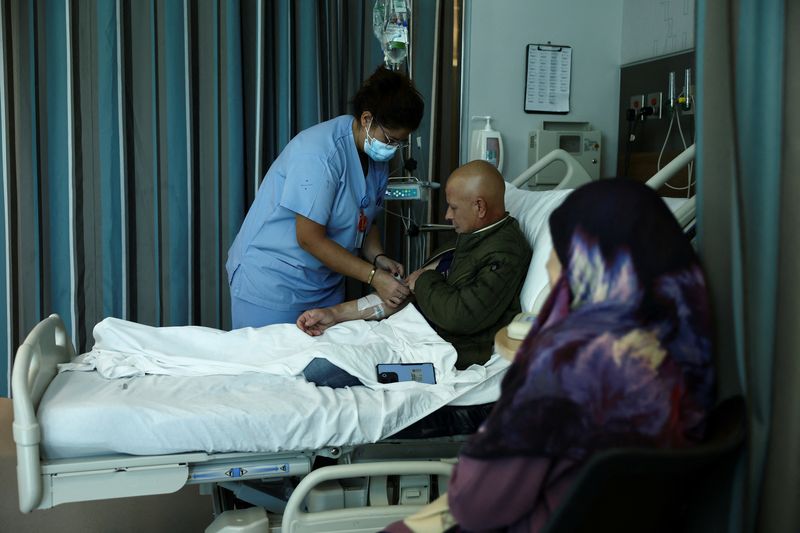By Riham Alkousaa and Emilie Madi
BEIRUT (Reuters) - Lebanese small business owner Ahmad Fahess thought nothing could be more devastating than his cancer diagnosis until suddenly, while he was at work one day, Israeli airstrikes started targeting his town of Nabatieh in south Lebanon.
When he saw the tangled mess around him, he knew he had to grab his family and flee.
"We want to go back to our homes, to our work," he said, breaking into tears as he received cancer treatment at the American University of Beirut's Medical (TASE:PMCN) Center (AUBMC), his sister sitting next to his bed.
Israel launched a broad attack on southern Lebanon in September, almost a year after Iran-backed Hezbollah militants there stepped up their rocket fire on northern Israel as Israeli forces fought Hamas gunmen who had attacked Israel from Gaza.
Washington is trying to broker a ceasefire but Israel says it must be able to continue defending itself. It says Hezbollah uses civilians as human shields, something the militants deny.
A father of two teenagers who owned four welding shops in Nabatieh, Fahess is now not only unsure when he will be able to go home, but also how long he will be able to access treatment for the rare cancer, sarcoma, which affects the connective tissue in his left arm.
"I used to come three days to Beirut for treatment and go back home," he said. "Now with the war, we were displaced, and the treatment struggle started."
Thousands of cancer patients are among more than a million people who have fled their homes.
"It all happened very quickly. We were at work when the shelling started; we were surprised by it," he said. He fled with his family to Antelias in Mount Lebanon with only $4,500 that quickly dwindled.
Fahess now depends on the hospital's Cancer Support Fund, a charity initiative launched in 2018 to assist cancer patients and now also giving extra support to displaced individuals.
"The treatment is costly; if the hospital didn't help me, I couldn't have afforded it," he said.
But he is worried about funding drying up. "If we have to pay and we're back at our homes, it would be fine, but if we are still displaced, it'll be impossible," he said.
Lebanon's health ministry said more than 2,500 displaced cancer patients have been forced to find new treatment centres, as at least eight hospitals in southern Lebanon and Beirut's southern suburbs were out of action due to Israeli shelling.
Cancer was already expensive to treat under Lebanon's healthcare system, which in recent years has been battered further by economic crisis.
It is now under severe strain, said Ali Taher, the director of the Naef K. Basile Cancer Institute at AUBMC, adding that treating displaced patients has brought new complications, including finding their missing medical records and doctors.
"It's also difficult to get cancer screening ahead of time because it's no longer a priority for people," Taher said.
Ghazaleh Naddaf, 67, was displaced from the southern village of Debel. Now living with her brother in Beirut, the former pharmacist assistant lost her job and has been unable to afford her therapy for multiple myeloma for two months.
"I am skipping treatment and medication," she said. "I used to come twice a week for treatment, paying over $1,000. I can't afford it anymore," adding that she also needs a bone marrow transplant costing $50,000, an expense far beyond her reach.
"It's war, and there is no safety, and I still need to go through the treatment to get on with my life," she said.

Hala Dahdah Abou Jaber, co-founder of the Cancer Support Fund, said displaced cancer patients have to choose between basic necessities and life-threatening therapies and many can no longer co-pay for their treatment.
"Cancer doesn't wait. Cancer is not a disease that gives you time; it's harsh," she said.